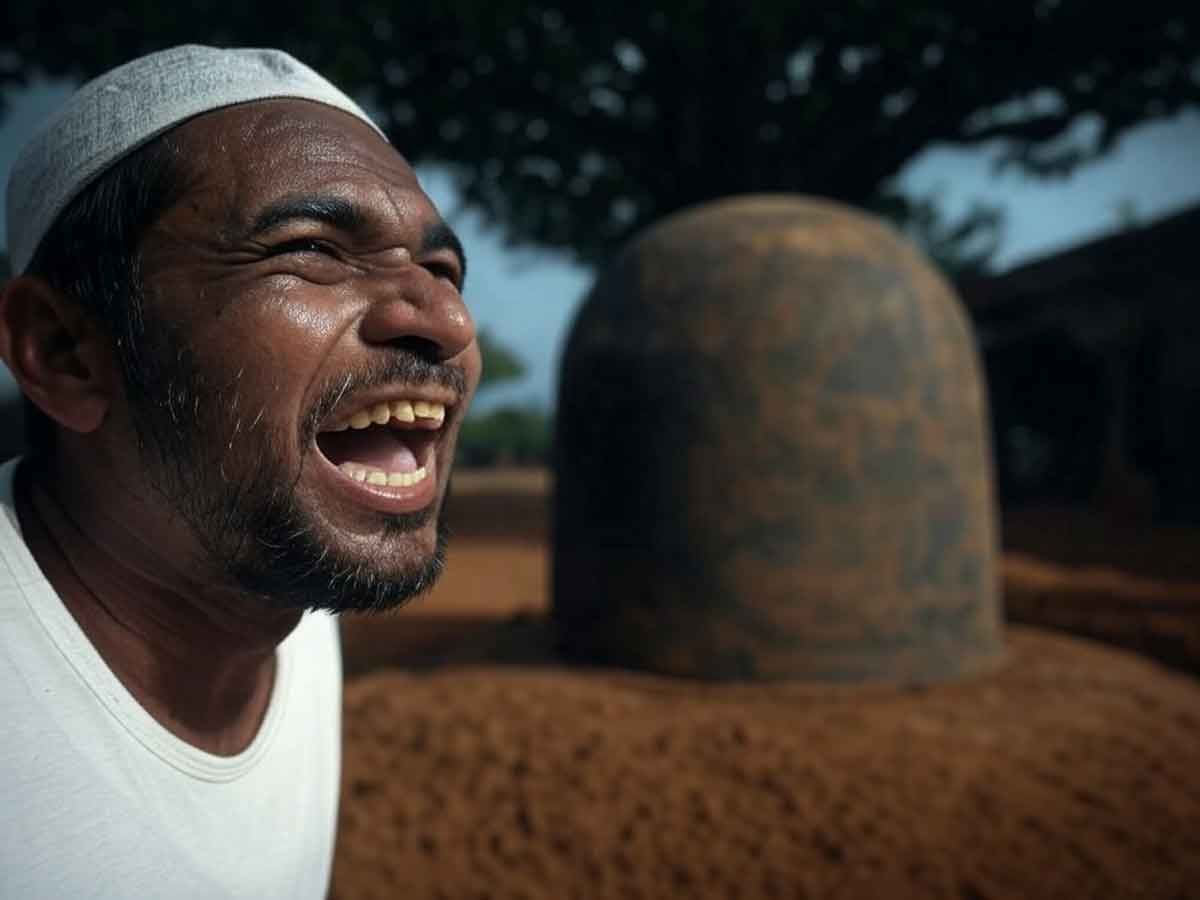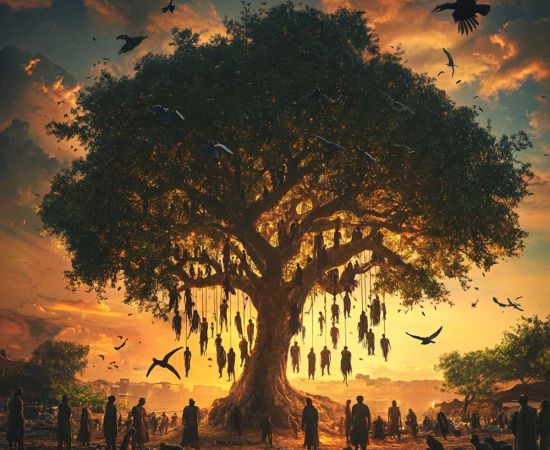MORE COVERAGE
Twitter Coverage
Satyaagrah
Written on
Satyaagrah
Written on
Satyaagrah
Written on
Satyaagrah
Written on
Satyaagrah
Written on
JOIN SATYAAGRAH SOCIAL MEDIA
"मुहिम-ए-कब्जा": In a Hindu-majority village, the Waqf Board's dark conspiracy emerges, claiming 3 acres—homes, farmlands, and a revered Shivling—without evidence, ordering immediate evacuation, fuelling deep anxiety and fierce anger among villagers

In a small village called Makhani, just 8 kilometers away from the Raisen district headquarters in Madhya Pradesh, a troubling situation has unfolded. The Waqf Board, an authority that manages certain properties under Islamic law, has sent out a stern notice to seven families living there. The notice clearly states, "This is the property of the Waqf Board." It doesn’t stop there—it further warns, "Vacate the land within 7 days. If the land is not vacated, legal action will be taken." Naturally, this message has left the families shaken and confused. Frightened by the sudden demand, they didn’t sit quietly. Instead, they gathered their courage, made their way to the Raisen Collector’s office, and poured out their worries to the officials, hoping someone would listen and help them through this unexpected crisis.
The people of Makhani, a village where most residents are Hindu, are still reeling from the shock of what’s happening. The Waqf Board hasn’t just claimed a small patch of land—it’s gone after everything, from the homes where families sleep at night to the fields where they grow their crops, and even a sacred Shivling, a symbol of deep religious meaning for the villagers. This bold move by the Waqf Board has stirred up a wave of anger across the community. Reports say the board has been sending out notices left and right, telling people that the land they’ve called home for years actually belongs to it and that they need to leave immediately. The idea of losing their houses, their farms, and a holy site has hit the villagers hard, and they’re not ready to accept it without a fight.
The tension in Makhani village is thick enough to feel in the air, especially for the seven families who’ve been directly told to pack up and go. These families aren’t strangers to this place—they’ve got deep roots here. As they put it themselves, "they have been living on this land for 150 years. Now they are being given notice to vacate it." Imagine waking up one day to find out the home your great-grandparents lived in, the land your family has farmed for over a century, is suddenly being taken away with just a week’s warning. The farmers, in particular, are furious. They’ve taken their frustration straight to the Raisen Collectorate, handing over a written plea to Collector Arun Kumar Vishwakarma, begging him to step in and do something about it. For these families, this isn’t just about land—it’s about their history, their livelihood, and their identity. They’ve been living in Makhani for generations, passing down stories and traditions tied to this very soil. Official government records even list this land as belonging to the government, adding another layer of confusion to the mess. On top of that, some of these families have built small homes, or cottages, under the Pradhan Mantri Awas Yojana, a government scheme meant to help the poor own a house. Now, they’re left wondering how something meant to secure their future could be snatched away so suddenly.
The whole situation has turned life upside down for these villagers. They’re not just fighting for a piece of property—they’re fighting for the place they’ve always called home. The notice from the Waqf Board has lit a spark of outrage, and the families are banding together, determined to protect what’s theirs.
Waqf Board Claims 3 Acres, Offers No Proof
The trouble in Makhani village keeps growing, and now more details are coming to light about what the Waqf Board is up to. According to news reports, the board is insisting that a big chunk of land—about 3 acres—in this quiet village is actually part of a graveyard they control. But here’s the catch: they haven’t shown a single solid piece of evidence to back up this claim. No old documents, no maps, nothing that proves this land belongs to them. Even so, the notice they sent out doesn’t hold back—it lists everything from the villagers’ homes where they’ve raised their kids, to the farmlands where they sweat under the sun to grow their food, to the platforms they sit on in the evenings, and even the village Shivling, a sacred spot that means so much to them. The Waqf Board isn’t wasting time either; they’ve demanded that everyone leave the land right away. You can imagine how this has left the people of Makhani feeling—scared about losing their homes one minute, and boiling with anger the next. It’s a heavy burden for these families, who are now caught in a storm they never saw coming.
Government Land Also Under Dispute
The Waqf Board’s claims don’t stop with the villagers’ properties—they’re reaching even further, putting their hands on land that belongs to the government itself. Official records, the kind kept in dusty files at government offices, clearly say this land is state-owned. But the Waqf Board is telling a different story. They’re saying it’s waqf property, meaning it’s under their control for religious or charitable use. Their version goes like this: a man named Qadir Khan once owned the village and gave it to the Waqf long ago. That’s their explanation—but it’s not sitting well with the people who actually live there. The locals have flat-out denied this tale, saying no one named Qadir Khan ever walked the streets of Makhani or called it home. To them, it sounds like a made-up story, and they’re not buying it for a second. This clash over government land just adds more fuel to an already burning fire, leaving everyone wondering who’s really in the right.
The families of Makhani aren’t new to this place—they’ve been here for generations, building their lives brick by brick. They’re not the type to just roll over and let this happen. They’ve dug their heels in, declaring loud and clear that they won’t abandon their land without a fight. They’re ready to stand up to the Waqf Board, no matter how long it takes or how tough it gets. What’s really stirring up the pot, though, is the claim over the Shivling. That’s not just a piece of stone to them—it’s a symbol of their faith, a part of their daily lives and prayers. The idea that the Waqf Board can swoop in and take it has sparked a deep resentment among the villagers. They’re calling it an overreach, an unfair grab at something that’s theirs in every sense of the word. You can feel the frustration bubbling over as they accuse the board of crossing lines that should never have been crossed, encroaching on their homes, their land, and their beliefs all at once.
The Collector Assured of an Inquiry
The people of Makhani village are living in a nightmare ever since those notices from the Waqf Board landed in their hands. Sleep doesn’t come easy anymore—not when you’re worried about losing the only home you’ve ever known. The villagers are heartbroken but fierce, standing together with a fire in their eyes. They’ve made their stance crystal clear, saying, "We will lose our lives but will not vacate this land. The ancient historical temple and cremation ground are also built on this land. If this was the land of the Waqf Board, then how did we get the cottage under the Pradhan Mantri Awas Yojana." These aren’t just words—they’re a cry from the heart. For them, this land isn’t just dirt and stones; it’s where their ancestors prayed at the old temple, where they said their final goodbyes at the cremation ground, and where they built their modest homes with help from the government’s housing scheme. The Pradhan Mantri Awas Yojana gave them cottages, a sign of stability after years of struggle, and now they’re asking how that could happen if the Waqf Board owned it all along. It’s a question that’s keeping them up at night, and they’re desperate for answers. Thankfully, someone’s listening. Raisen Collector Arun Kumar Vishwakarma has stepped into the mess, offering a glimmer of hope. He’s assured them, saying, "The matter has come to our notice. We will investigate on what basis the Waqf Board has issued the notice. We will take appropriate action after hearing both the parties." For the villagers, this promise of an inquiry feels like a lifeline. They’re clinging to the idea that the truth will come out, that someone in charge will dig into the Waqf Board’s claims and figure out what’s really going on. It’s not a solution yet, but it’s a start, and right now, that’s enough to keep them holding on.
Waqf Board’s Growing Controversies
The uproar in Raisen isn’t happening in a vacuum—it’s part of a bigger storm swirling around the Waqf Board across India. This latest clash in Makhani comes at a tricky time, just as the Government of India is wrestling with how to handle the board’s powers through a new Waqf Amendment Bill. This bill isn’t some distant idea either—it’s already making waves. The Joint Parliamentary Committee (JPC) working on it brought it up in the Rajya Sabha in February 2025, showing that the government is serious about tackling the problems tied to the Waqf Board’s reach. And problems there are plenty. Over the past few years, the board’s actions have sparked outrage far beyond Makhani village. They’ve been laying claim to all sorts of places—temples where people have prayed for generations, lands owned by Hindu families who’ve worked them for decades, even government properties that should be untouchable. It’s like the board’s influence has grown without anyone keeping it in check, and people are fed up. The controversy in Raisen is just the latest chapter in a story that’s been building for a while, one where ordinary folks feel pushed to the edge by an authority they don’t trust. For the villagers of Makhani, this isn’t just about their land—it’s about a pattern they’ve seen too many times before, and they’re hoping this bill might finally put a stop to it.
The families caught up in this fight aren’t alone in their frustration. All over the country, stories like theirs have been piling up, each one adding to the noise against the Waqf Board. The idea of losing a temple or a home to a claim that doesn’t even come with proof—it’s the kind of thing that makes your blood boil. And now, with the government stepping in and the collector promising a fair look at the situation, there’s a sense that something might finally shift. The people of Makhani are watching closely, their hearts heavy but their spirits unbroken, waiting to see if justice will find its way to their little corner of Madhya Pradesh.
 |
 Support Us
Support Us
Satyagraha was born from the heart of our land, with an undying aim to unveil the true essence of Bharat. It seeks to illuminate the hidden tales of our valiant freedom fighters and the rich chronicles that haven't yet sung their complete melody in the mainstream.
While platforms like NDTV and 'The Wire' effortlessly garner funds under the banner of safeguarding democracy, we at Satyagraha walk a different path. Our strength and resonance come from you. In this journey to weave a stronger Bharat, every little contribution amplifies our voice. Let's come together, contribute as you can, and champion the true spirit of our nation.
 |  |  |
| ICICI Bank of Satyaagrah | Razorpay Bank of Satyaagrah | PayPal Bank of Satyaagrah - For International Payments |
If all above doesn't work, then try the LINK below:
Please share the article on other platforms
DISCLAIMER: The author is solely responsible for the views expressed in this article. The author carries the responsibility for citing and/or licensing of images utilized within the text. The website also frequently uses non-commercial images for representational purposes only in line with the article. We are not responsible for the authenticity of such images. If some images have a copyright issue, we request the person/entity to contact us at satyaagrahindia@gmail.com and we will take the necessary actions to resolve the issue.
Related Articles
- "जुनून-ए-इश्क़": A rickshaw puller in Indore, Arshad Pathan posed as Harish, raped a Hindu woman, forced unnatural sex, forced her to convert, his brother Sabir also raped her, and their family intimidated her; police booked and all six absconding
- MP Police arrested accused Armaan Khan, and 3 others for slaughtering a cow in Vidisha, tensions grip as stone-pelting follows, rioters damaged a religious place, residential properties, and a shop
- Rajasthan Board of Muslim Waqf despite being land-rich itself turns to the State government for financial assistance in order to pay its workers’ salaries
- Rampur’s royal family finally repossess waqf properties ‘encroached’ by imprisoned Samajwadi Party MP Azam Khan after a thorough investigation by the Uttar Pradesh Shia Central Waqf Board
- "डैडी अंकल": Computer teacher Qasim Rehan arrested for raping a 3-year-old girl child at Radcliffe School, Bhopal; watched porn minutes before the assault, while the school failed to act, sparking protests, a SIT inquiry, calls for justice & school sealed
- Hyderabad horror: Sons of political personalities, including AIMIM MLA linked to appalling case of gangrape of minor in red Mercedes in Hyderabad, identified two are Saduddin Malik and Omer khan while other 3 are minors
- "इस्लामी तालीम": Vikram Univ initiates a thorough investigation into Prof Anis Shaikh for promoting Islam, systematically giving lower grades to Hindu students and forming an exclusive WhatsApp group for female students, stirring significant campus unrest
- "It is customers’ right": Declares Ujjain Mayor Mukesh Tatwal, mandating all shops display owners' names and phone numbers prominently, inspired by similar directives from the Uttar Pradesh and Uttarakhand governments for the Kanwar Yatra route
- Waqf board gets stay on demolition of illegal madarsa after Surat Municipal Corporation fails to update records on time, may hijack second property in just 3 months: Land Jihad surges in Gujarat
- An attempt of Land Jihad bites the dust as Supreme Court orders 1654 acres of land back to the State Government and that it does not belong to Dargah Hazrat Hussain Shah Wali as Waqf Board claimed
- "Waqf Act is against secularism, unity, and integrity of the nation; Waqf is not mentioned anywhere in the Constitution" says Ashwini Upadhyay: Filed PIL in Delhi HC challenging provisions of Waqf Act
- "नारा ए तकबीर": Indore court sentences mother and her Muslim boyfriend Iliyas to 10-year jail for converting their 8-year-old Jain son to Islam, circumcising him, falsifying his birth certificate to list Iliyas as the father and enrolling him in a madrasa
- "करुं मैं क्या करुं": In a shocking incident at Semaria Higher Secondary School, Sidhi, a young girl overwhelmed by ongoing harassment and dirty jokes from Siraj Ahmed, slit her own throat with a cobbler’s tool and was hospitalized in critical condition
- "दरिंदे": In Gwalior, Salman, Imran, Mubarik, and Sameer Khan molested a girl, when her father Balkishan and brother Saurabh intervened to protect her, they were attacked, resulting in Saurabh being brutally stabbed with cut from his neck to below his ear
- "Sometimes it’s not the people who change, it’s the mask that falls off": Hindu activists arrested for protesting a Muslim trader using a fake Hindu identity to illegally operate a stall in Subramanya Swamy temple fair in Kodagu, Karnataka



























